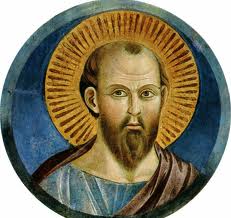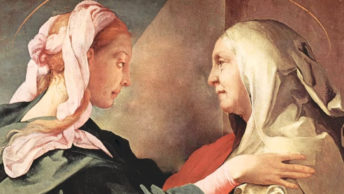
The greatest missionary in the history of the Church is, of course, St. Paul, who undertook several missionary journeys, made many converts, established churches, wrote much of the New Testament, and played a major role in defining and explaining Catholic doctrine. However, the Church has been blessed with many other great missionaries as well, including St. Patrick, who evangelized Ireland, where he had been enslaved for six years, and established the Irish Church; St. Boniface, who was known as the Apostle of Germany; St. Francis Xavier, who personally baptized many thousands of people in the Far East; St. Isaac Jogues and the other North American martyrs; and St. Peter Chanel, a missionary priest in the 19th century who died as a martyr on a South Pacific island. To be a missionary, however, doesn’t necessarily require one to go to a far distant land and personally preach the Gospel. Even though she never left the convent, and even though she died in severe agony from tuberculosis at the young age of twenty-four, St. Thèrése of Lisieux was named “patroness of foreign missions” thirty years after her death, simply because of her constant prayers and sacrifices offered for the spread of the Gospel.
A similar example of missionary fervor is seen in the life of another 19th century French woman: Venerable Pauline-Marie Jaricot, who underwent a deep spiritual conversion as a teenager. She began asking all the girls she knew to pray one decade of the Rosary each day for the spread of the Gospel, and to contribute a few cents a week to the missions; moreover, each girl was to ask ten more girls for this same donation. Pauline called this approach “prayers and pennies,” and this was the origin of the Society for the Propagation of the Faith—which Pauline established when she was only twenty years old. This apostolate helped establish the Church in various places throughout the world, including in our own country down in Louisiana. Pauline was a great organizer, and later established the Association of the Living Rosary, which promoted that prayer, and the Association of the Holy Childhood, which helped establish Catholic schools and orphanages for abandoned children. Her life wasn’t an easy one; she suffered heartbreak, betrayal, and a severe illness which threatened her life. However, she was miraculously cured through the intercession of St. Philomena, and in gratitude presented one of the saint’s relics to her close friend St. John Vianney, the Curè d’ Ars. Pauline Jaricot died in 1862, and the cause of her beatification and canonization has been introduced in Rome.
The lives of St. Thérèse of Lisieux, and Venerable Pauline-Marie Jaricot, demonstrate two very important points. First, every Catholic, no matter what his or her calling from God may be, has a responsibility to help spread the Gospel; and second, we’re all given some important opportunity to help do this, regardless of our particular vocation, our circumstances in life, and the unique challenges we face. Even if we’re in very poor health, we can pray; even if our finances are limited, we can make a small sacrificial donation to the missions; even if we’re simple or uneducated, we can give a Christian example and always strive to act in a spirit of charity. In this way we will be obeying Christ’s law of love, and bearing witness that He is truly our Lord and Savior.
In its system of teachings, sacraments, rules, authority, and hierarchy, Catholicism is marvelously organized and complex—and yet at the same time it is wonderfully simple and easily understood. This is seen most clearly in terms of the commandments. God gave Moses Ten Commandments, and Judaism later developed 613 religious regulations. Catholicism has six precepts of the Church, and there are 1752 individual regulations in the Code of Canon Law—but all of these rules and procedures, important as they may be, can be summed up very simply. As Jesus tells us, the greatest or most important of all commandments is to love God with all our hearts, and the second is to love our neighbor as ourselves. If we’re doing this, we’ll automatically try to observe the other laws, and if we’re doing this, we’re showing that our faith is real. Loving our neighbor, of course, means praying for and helping not only those who are personally known to us, but also those persons in need whom we’ll never see—especially those who’ve not yet heard the Gospel. God loves and cares for everyone, not merely those who are publicly identified as His people.
There are over 1,150 mission dioceses and territories throughout the world, covering two-thirds of the globe—and U.S. Catholics are the largest single source of financial support for this vital ministry of sharing the Gospel. Our contributions help the religious sister in Kenya working with street children trying to rebuild their lives. Our donations assist the priest celebrating Mass for rural Catholic communities in Bangladesh suffering from devastating floods (World Mission Sunday booklet). We’re helping support orphanages in Sri Lanka and Thailand, schools in the new nation of South Sudan, a seminary in Nairobi, catechism classes in rural Vietnam, a hospital in Peru, and many other such efforts throughout the world—all of which are living examples of the Gospel in action, and opportunities to share the Good News of Jesus Christ. Our donations are a way of investing in eternity, and of helping recruit ever more citizens for the Kingdom of Heaven.
Most of us are not called to renounce our way of life, perform amazing deeds, or make heroic sacrifices. Instead, the Lord wants us to influence the people around us by living out our faith, while also offering our prayers and contributions for the spread of the Gospel. We are privileged to have this opportunity to be evangelizers, and we are blessed to have this chance to be of service in this way. As Jesus says, everything depends on whether or not we truly love God and our neighbor—and for this reason, helping spread the Good News of salvation is one of the most important things we can ever do.








